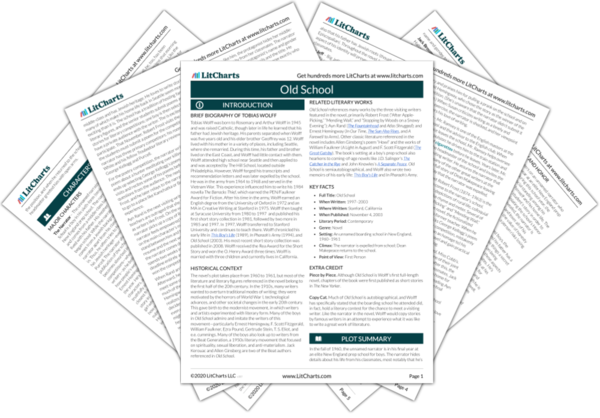Susan Friedman Quotes in Old School
By now I’d been absorbed so far into my performance that nothing else came naturally. But I never quite forgot that I was performing. In the first couple of years there’d been some spirit of play in creating the part, refining it, watching it pass. There’d been pleasure in implying a personal history through purely dramatic effects of manner and speech without ever committing an expository lie, and pleasure in doubleness itself: there was more to me than people knew!
All that was gone. When I caught myself in the act now I felt embarrassed. It seemed a stale, conventional role, and four years of it had left me a stranger even to those I called my friends.
The whole thing came straight from the truthful diary I’d never kept: the typing class, the bus, the apartment; all mine. And mine too the calculations and stratagems, the throwing over of old friends for new, the shameless manipulation of a needy, loving parent and the desperation to flee not only the need but the love itself. Then the sweetness of flight, the lightness and joy of escape. And, yes, the almost physical attraction to privilege, the resolve to be near it at any cost: sycophancy, lies, self-suppression, the masking of ambitions and desires, the slow cowardly burn of resentment toward those for whose favor you have falsified yourself. Every moment of it was true.
Susan considered my caper with her story a fine joke on this ivy-covered stud farm, and on Papa, as she acidly called him, and on the idea of literature as some kind of great phallic enterprise like bullfighting or boxing.
A writer was like a monk in his cell praying for the world—something he performed alone, but for other people.
Then to say it did no good! How could she say that? Of course it did good. And I stood there half-drunk and adrift in this bay of snoring men, and gave thanks for all the good it had done me.

Susan Friedman Quotes in Old School
By now I’d been absorbed so far into my performance that nothing else came naturally. But I never quite forgot that I was performing. In the first couple of years there’d been some spirit of play in creating the part, refining it, watching it pass. There’d been pleasure in implying a personal history through purely dramatic effects of manner and speech without ever committing an expository lie, and pleasure in doubleness itself: there was more to me than people knew!
All that was gone. When I caught myself in the act now I felt embarrassed. It seemed a stale, conventional role, and four years of it had left me a stranger even to those I called my friends.
The whole thing came straight from the truthful diary I’d never kept: the typing class, the bus, the apartment; all mine. And mine too the calculations and stratagems, the throwing over of old friends for new, the shameless manipulation of a needy, loving parent and the desperation to flee not only the need but the love itself. Then the sweetness of flight, the lightness and joy of escape. And, yes, the almost physical attraction to privilege, the resolve to be near it at any cost: sycophancy, lies, self-suppression, the masking of ambitions and desires, the slow cowardly burn of resentment toward those for whose favor you have falsified yourself. Every moment of it was true.
Susan considered my caper with her story a fine joke on this ivy-covered stud farm, and on Papa, as she acidly called him, and on the idea of literature as some kind of great phallic enterprise like bullfighting or boxing.
A writer was like a monk in his cell praying for the world—something he performed alone, but for other people.
Then to say it did no good! How could she say that? Of course it did good. And I stood there half-drunk and adrift in this bay of snoring men, and gave thanks for all the good it had done me.











